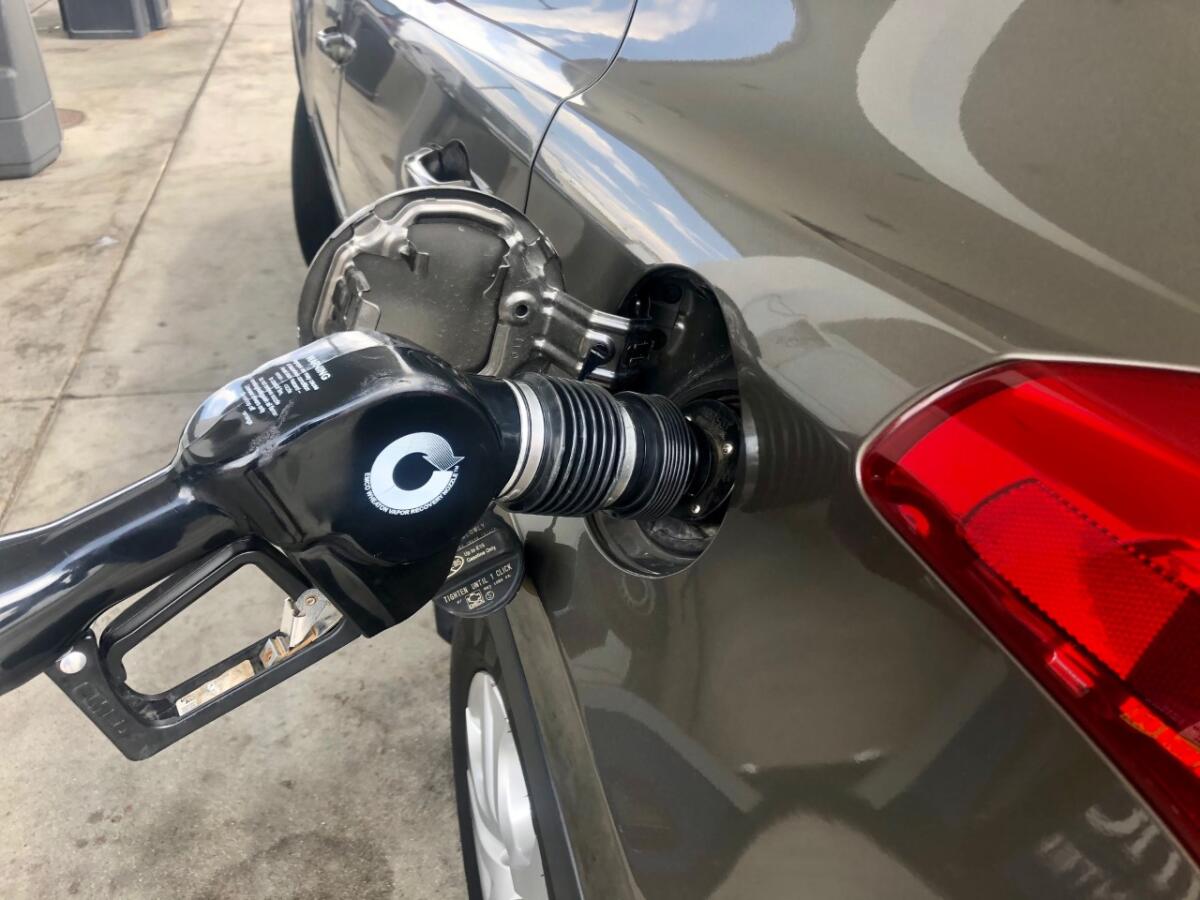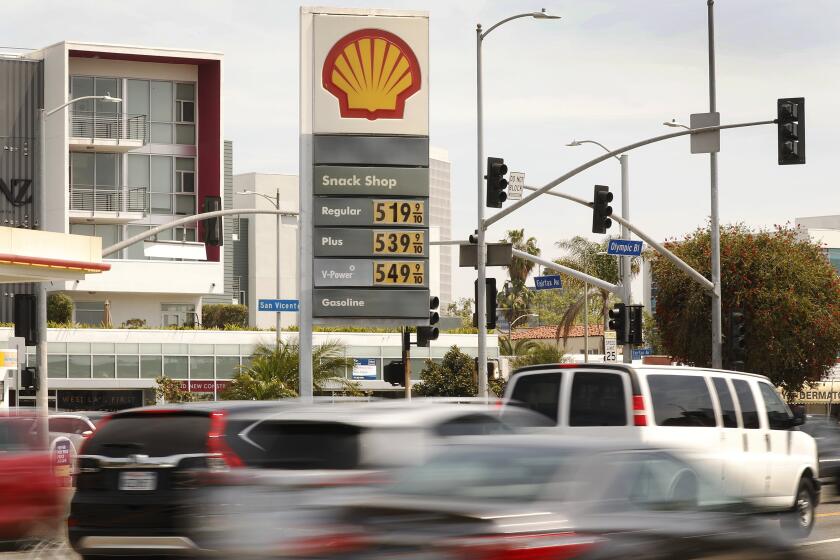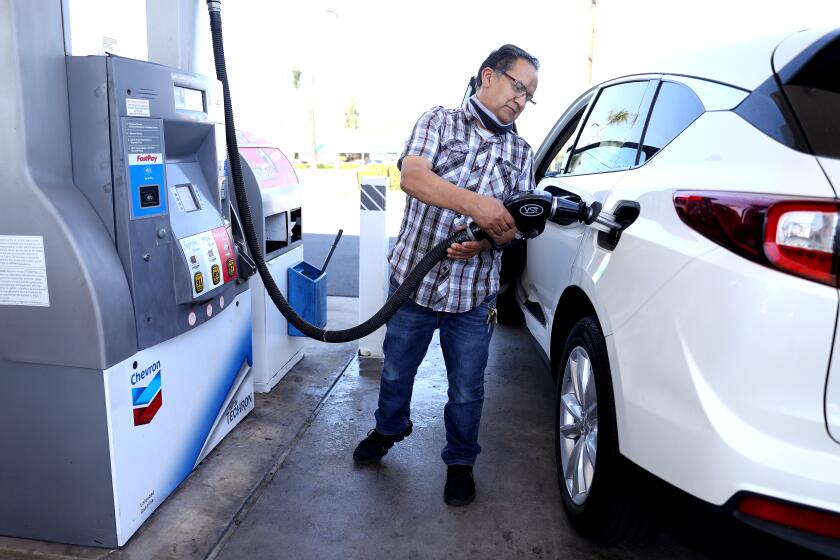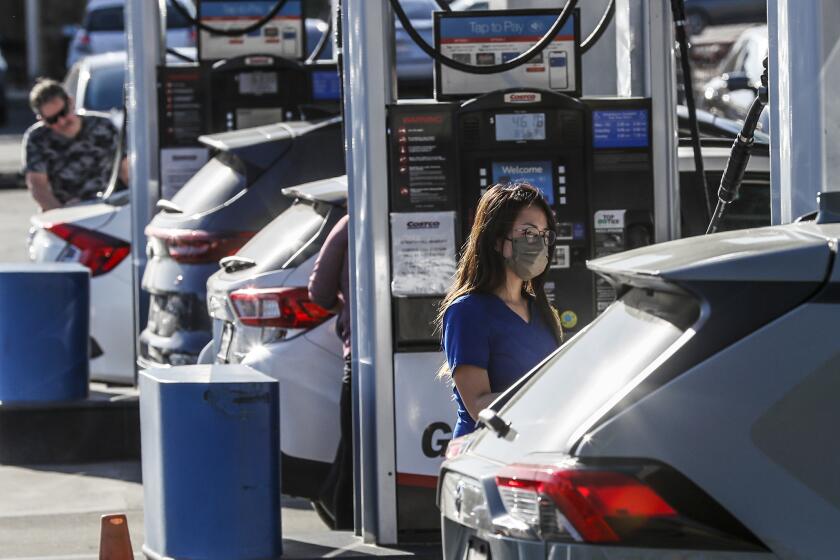California gas rebates may not arrive until late summer. Or even later

SACRAMENTO — After missing multiple self-imposed deadlines, Gov. Gavin Newsom and legislative leaders remain at odds over how to offer relief from California’s high gas prices — criticizing one another’s plans and prolonging an already lengthy process that stands in the way of residents’ cash payments.
Selecting a state agency to oversee the program is the latest point of contention, a decision that could determine how quickly people receive rebates.
The governor has warned against a legislative plan to leave the process to the state Franchise Tax Board, the agency that distributed state-issued pandemic relief checks. Instead, he has proposed hiring a third-party vendor to work with the California Department of Motor Vehicles in providing debit card payments to car owners, though lawmakers say they have little confidence in that approach and that refunds should not be given strictly to drivers.
“Our approach with the DMV was exclusively an approach of necessity because FTB can’t get these checks processed as they’re doing tax returns,” Newsom told The Times’ Editorial Board in late April.
With annual tax refund checks to distribute and even some pandemic relief payments still unsettled, the governor said relying on the Franchise Tax Board could delay new cash rebates until at least October.
As of April 22, at least 73,000 Californians were still waiting for checks totaling more than $50 million to alleviate the economic burden of the COVID-19 pandemic, according to the tax board. More than 20,000 of those checks were part of the state’s first round of pandemic relief and should have arrived last year, according to the state’s projected time frames.
“We’re still in fact sending out Golden State Stimulus checks even now,” Newsom told The Times’ Editorial Board. “Most of them were done, but there’s still some going out.”
Gov. Gavin Newsom had proposed one-time cash payments in response to the recent surge in gas prices. This plan would be more far-reaching.
But some state lawmakers and anti-poverty advocates say the tax agency is preferable to creating a new program through the DMV.
“This is a huge state and setting up a new system and infrastructure inevitably takes longer than planned, even with the best of intentions,” said Chris Hoene, executive director of the California Budget and Policy Center, a nonprofit group that advocates for low-income residents.
“There is a fundamental tension in the governor’s proposal that the administration has not resolved,” he said. “They want early action from the Legislature in order to deliver money to people more quickly, but they want to do so by trying out an untested new system.”
Concerns about the DMV are not new. In 2019, state auditors found “significant deficiencies” in its operations, citing long lines of customers due, in part, to outdated technology. Newsom has since called for a systems overhaul of the department, with projects still underway.
To cope with rising inflation, legislative leaders unveiled a plan in mid-March to send at least $200 to taxpayers with joint tax returns showing an adjusted income of less than $250,000 — regardless of whether they own a car. Newsom followed days later with the details of his own plan to give at least $400 to every registered vehicle owner in California, focusing on gas prices.
The governor set a goal of signing off on gas rebates before he introduced his revised budget, which is scheduled to take place this week, with the hope of getting payments out the door as early as July.
But Anthony York, senior communications advisor to the governor, said that an agreement would likely be delayed until lawmakers and the governor reach a budget deal next month. Under that revised timeline, the first payments in Newsom’s plan would not be sent until September at the earliest.
“The governor wanted early action, but clearly the Legislature and the administration have a difference of opinion about the best way to provide relief to Californians, and it now looks like that’s going to be wrapped into the larger budget negotiations,” York said.
More than a month after Gov. Gavin Newsom pledged to give Californians money to offset rising gas prices, he and state lawmakers have yet to find common ground on the plan.
Newsom has signaled a willingness to compromise, saying he’s not “wedded” to his original approach. “I told the Legislature this is a no-brainer to come together and figure out,” the governor said to The Times’ Editorial Board.
Even so, a key issue is likely to be what limits, if any, will be placed on eligibility.
Senate President Pro Tem Toni Atkins (D-San Diego) said the eventual plan needs to be focused on helping those Californians who need it the most — a goal that isn’t likely to be met by focusing on vehicles.
“That plan leaves out non-car owners — the poor, the elderly, the environmentally conscious,” she said in a statement. “All Californians are impacted by the growing costs of consumer goods and are deserving of relief.”
Newsom’s original plan to focus on vehicle owners would exclude drivers whose registrations are not valid — a policy that anti-poverty advocates say would leave out people who are behind on DMV fees and could use the cash the most.
Sarah Williams, an attorney for Rubicon Programs, a Bay Area organization that focuses on economic mobility, said many Californians cannot afford to pay traffic and parking fines, which can lead to late fees and invalid registrations.
“The governor’s plan is not taking into account how a lot of people living in poverty live their lives, which is prioritizing the bills that they pay,” she said. “In a lot of these cases, it’s not willful that people have not paid their registration; it’s because they literally cannot.”
H.D. Palmer, a spokesperson for the California Department of Finance, pointed to $750 million in Newsom’s proposal that would offer Californians free public transit fares for three months in response to equity concerns.
“The proposal understandably focuses on people who have been paying at the pump and feeling the direct impact of that, but it also more broadly addresses that equity issue by providing incentive grants for free fare and then some, whether it’s the L.A. Metro, the BART or the light rail in Sacramento,” Palmer said.
Gov. Gavin Newsom’s plan would offer $400 to Californians for each vehicle registered in their name, including motorcycles and electric cars.
The Golden State Stimulus program was declared a success by state officials and doled out 4.5 million stimulus grants worth nearly $2.9 billion in the first round, and 8.4 million grants worth nearly $6.1 billion in the second round.
More than 99% of eligible Californians have received their checks, according to the tax board, but for the unlucky 1%, the process has been complicated. And it has required filing claims with the state to secure payments that may have been better used at the start of the pandemic when economic situations may have been most dire.
A spokesperson for the Franchise Tax Board said the agency expects to issue another “much smaller batch” of payments this month but did not say how many. The tax board attributes the delays to amended or duplicated tax returns and errors like misspelled names and wrong addresses. In some cases, a recipient has died and checks must be changed to the surviving spouse’s name.
A yellow banner at the top of the Franchise Tax Board website warns that the agency is again bracing for impact.
“FTB is aware of multiple proposals from the governor and Legislature to help Californians cope with rising prices of gas and other goods,” the disclaimer states. “While you may be seeing discussion in the media/social media on proposals related to gas prices and taxes, we have no information to offer at this time because the ideas are only proposals and no law has been enacted yet.”
More to Read
Sign up for Essential California
The most important California stories and recommendations in your inbox every morning.
You may occasionally receive promotional content from the Los Angeles Times.















